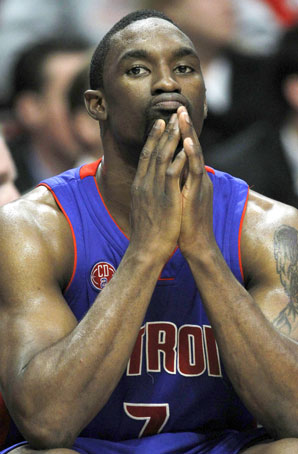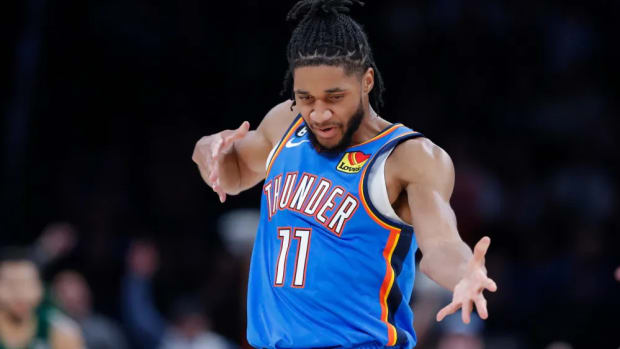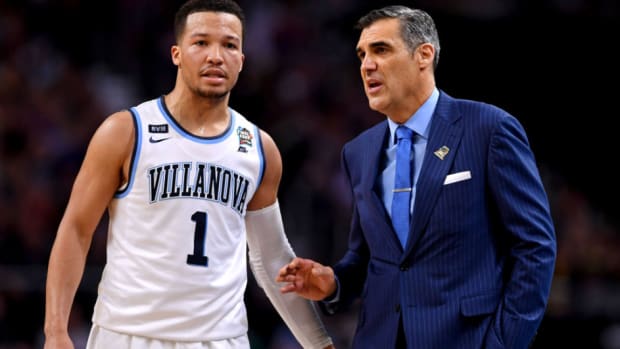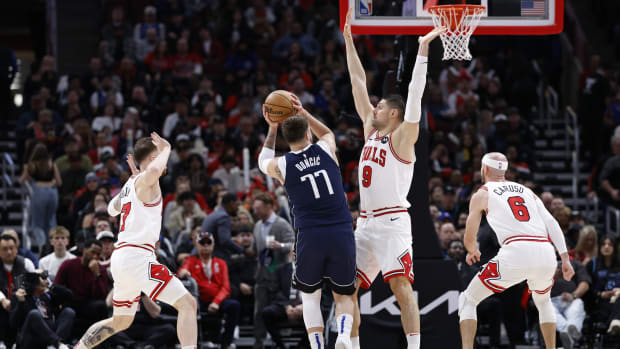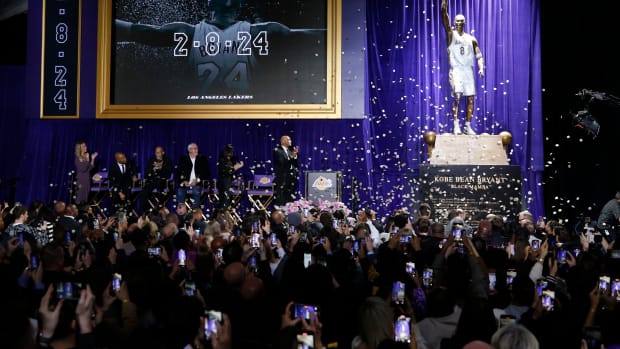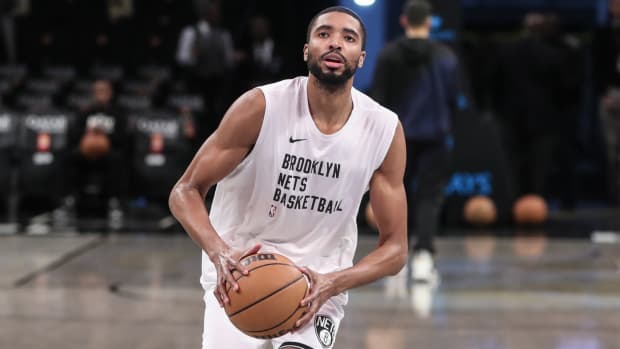Roundtable: Pistons fading fast
1. Detroit's losing streak has reached 13 games. What moves need to be made for the Pistons to turn things around?
Ian Thomsen: Team president Joe Dumars doesn't believe in tearing down a team to rebuild from scratch through the lottery, and that isn't what happened here. The injuries to team leaders Richard Hamilton and Tayshaun Prince put the Pistons on this losing track, and no move can salvage this season. The goal now should be to get a high draft pick, including a shot at Kentucky point guard John Wall -- the Pistons currently have the third-worst record in the league -- while trying to develop rookie Austin Daye. Trades that might help the Pistons this season are counterproductive, because there is nothing left to save this year. But next year, Prince's expiring contract will be tradable for younger talent, as will Hamilton's contract the following season.
Jack McCallum: One thing is certain: Dumars will do something and do it before the Pistons turn into the winter version of the Lions. Joe D. was known as a conservative player, but he's an action-oriented GM. The fact that Hamilton hasn't been traded indicates how difficult it is to get a taker on the remaining three years and $38 million on his contract. That's the obvious move to allow Ben Gordon and Rodney Stuckey to become the backcourt of the future. If that doesn't happen, the Pistons will continue to dangle the pieces (regrettably, that might mean Prince) that could land Minnesota's Al Jefferson or Utah's Carlos Boozer.
Chris Mannix: Injuries have crippled the Pistons and made first-year coach JohnKuester's job -- which was bound to be difficult the moment he signed -- nearly impossible. With so many players sidelined, it's been tough for Detroit to develop any chemistry. But I wouldn't make any knee-jerk reactions just yet. Dumars knew he was in for some bumps when he decided to overhaul the team early last season by trading Chauncey Billups. These growing pains might be sharper than he expected, but I'd give this team a chance to get healthy before I start shaking things up.
2. In light of the Gilbert Arenas gun incident, the Nets have decided to ban intrateam betting on flights. But can teams realistically outlaw all forms of betting and gambling among players and coaches?
Thomsen: The tradition of card games among players and coaches on trains and planes is as old as the NBA. The league itself can't reasonably enforce a ban because this kind of gambling takes place out of public view. If these card games become a major issue, I can imagine it breaking down this way: Coaches who are able to command respect and hold authority over their teams will likely allow gambling in confidence that they'll be able to police, while coaches of young teams, such the Nets (who have an interim coach in KikiVandeweghe), aren't likely to be as trusting.
McCallum: Of course not. Post-practice shooting games -- and we're talking about shooting a basketball -- are every bit as popular a gambling outlet as cards for NBA players. And on many teams, that particular outlet is an extremely important part of building chemistry and team personality. Sure, the league and individual team execs should counsel their players about the dangers of high-stakes games, but this isn't day care.
Mannix:Stan Van Gundy told me recently that it's impossible to legislate against all forms of temptation, and he's right. If card playing is banned, players will start betting their per diem on what time the plane lands. Gambling, for better or worse, is an ingrained part of American culture and it's not going anywhere anytime soon. A possible solution, at least to me, is educating players more when they enter the league. The NBA already has required rookie symposiums, but I say make them longer and more intense. Bring in some of the scores of ex-players who have fallen down on their luck (like, say, Antoine Walker) because of gambling, and do everything possible to hammer home the point that this money -- as easy as it seems to come now -- may not last forever.
3. Billy Hunter is already preparing for labor unrest some 18 months before the NBA's collective bargaining agreement expires. In doing so, he told SI.com that the league cannot withstand another lockout and, should one happen, some teams will be put out of business. Do you agree with his statement?
Thomsen: The modern history of labor difficulties in all sports shows that leagues can survive and profit after labor stoppages. The NFL, MLB and NBA have all recovered from them, but it has always taken at least one painful year to bring back the fans. Many team owners would respond that they can't survive as things stand today. My impression is that many of them would prefer a lockout to the current system -- they'll lose less money by sitting out the 2011-12 season than by continuing to pay the players' current salaries. Both sides would be better off avoiding a lockout and working out their differences; they're going to come to an agreement anyway, so why not do so without squandering billions of dollars along the way? The bottom line is the owners are going to believe they can withstand a lockout longer than the players.
McCallum: Clearly, they're not calling people like me in to do their accounting, but I believe him. Attendance and revenues are generally down in this terrible economy and something just may give. Look to the franchises where the numbers are weak and the pro tradition isn't strong. Like Memphis.
Mannix: I don't think teams will go under -- Hunter might be getting a little carried away there -- but I can certainly see a few teams having to sell or relocate (New Orleans and Charlotte spring to mind) to stay afloat. It remains inexplicable to me that the Hornets returned to New Orleans after Hurricane Katrina. Yes, I understand the sentimental value in bringing the team back, but this wasn't the Celtics leaving Boston or the Lakers leaving L.A. This was a team that had been in the Big Easy for only a few years and had, for the most part, received little fan support, ranking toward the bottom of the league in attendance every year. Should there be a labor stoppage, I can see the Hornets being the team most adversely affected and possibly having to move -- again.
4. The Western Conference has, overall, been better than the Eastern Conference for the past 10 seasons, and this season is no different -- the West has 11 teams at .500 or better, while the East has only five. It's been suggested that the league retool the playoff brackets to ensure the best 16 teams make it to the postseason. You agree?
Thomsen: No, that wouldn't work fairly because Eastern teams play each other more often than Western teams, and vice versa. The only way to make that kind of a system feasible would be to revise the schedules so that teams played similar schedules regardless of conference. An interesting dynamic that could offset the top-to-bottom dominance of the West is that there may be as many, or more, title contenders in the East among Cleveland, Boston and Orlando. But that depends on how much you believe in Dallas, San Antonio and Denver as potential champions behind the Lakers in the West.
McCallum: This came up last year and I offered a hearty "Yesssssss!" It should be done. We've heard from the league office that this conference thing is "cyclical," but we're well beyond that after a decade of Western dominance. Why not? Regional rivalries are not that strong these days anyway.
Mannix: I say leave it alone, for two reasons. First, and this hardly qualifies as breaking news, but the NBA is cyclical. A sub-.500 record will probably get you into the playoffs in the East this season, but it might be the same way in the West 10 years from now after Kobe Bryant, Tim Duncan and Steve Nash have long since retired. Second, I'm a bit of a basketball romantic. If the NBA re-seeds, there is the possibility I will miss out on the stunning upset, like the barely .500 Knicks charging through the Eastern Conference in the lockout-shortened '99 playoffs. The system is not perfect, but it's manageable.






























